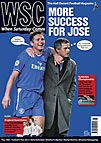 Australia may be getting a slightly easier ride to the World Cup by joining the Asian qualifying system, say Matthew Hall, but naturally, this one's all about money
Australia may be getting a slightly easier ride to the World Cup by joining the Asian qualifying system, say Matthew Hall, but naturally, this one's all about money
Don’t get confused. Australia’s entry into the Asian Football Confederation is not about a fairer passage to the World Cup finals. Although taking part in a genuine qualifying campaign of up to 16 games, home and away (rather than beating American Samoa 31-0 then facing a rampant Uruguay in a play-off) is an excellent side dish, the main meal is about something a little more complicated: money.
Europeans take for granted their national teams are in almost perpetual competition (World Cups, European Championships), play meaningful matches that are televised and, importantly, earn income. On the other side of the world, beggars in Oceania have a kick-around for both World Cup qualification and the confederation’s OFC Nations Cup, which, these days, Australia win by a cricket score
What little interest there is concerns whether Solomon Islands or Fiji will beat New Zealand for second place. All well and good, but zero TV coverage and little public-care factor mean teams such as Australia lose money from taking part in official competitions. Football Federation Australia bosses Frank Lowy and John O’Neill plotted a plan, hatched in China when they watched last year’s Asian Cup, a competition where 250 million people watched the final in China alone. Sell Australia to Asia and the sport will be revolutionised. “It was love at first sight,” Lowy said of his later meeting with Asian Football Confederation president Mohammad bin Hammam at an AFC gala dinner in Kuala Lumpur last year. “We like each other,” agreed Bin Hammam at the Sydney press conference in March announcing the unanimous AFC vote that invited Australia to join its ranks.
“I don’t think we can fully understand all the ramifications but I can tell you it is tremendous,” Lowy, one of Australia’s richest men, said. “This is an auspicious occasion.” Asia had previously frustrated Australia’s efforts to form a relationship, but liked the ideas the new Australian administration had to offer. Lowy’s credentials – he runs a multinational company that develops and owns shopping malls and sits on the board of the Reserve Bank of Australia (the equivalent to the Bank of England) – were impressive to the Asians. A private jet is always a good look when romance is blossoming.
Lowy and O’Neill’s trump card was Australia’s marketing strength – the national-team players. Liverpool fans might laugh, but Harry Kewell is considered a genuine star attraction. Only Hidetoshi Nakata, Shinji Ono and Sun Jihai can claim to be Asian footballers who have recently succeeded at the top level in Europe. Australia bring Kewell, Mark Viduka, Mark Schwarzer, Tim Cahill, Brett Emerton, and Lucas Neill from the Premiership, John Aloisi in La Liga and Parma pair Mark Bresciano and Vince Grella from Serie A.
Tim Cahill as Asian Footballer of the Year in 2006? An Asian nation beating England 3-1 at Upton Park? Throw in Australia’s new A-League. It all starts to add up. “Australia joining AFC will help to build football’s image in Asia,” the AFC president said. “One hundred per cent, Australia is going to help. It is a challenge for Asia to develop its football. Our fans want to see better football. Australia will bring to us one more developed football nation and a strong economic nation. This is what we want in football today, like Japan, Korea, China, Saudi Arabia and Iran.”
There are, as with anything FIFA have a hand in, bureaucratic obstacles. Reynald Temari, a progressive Tahitian boss of OFC, has given Australia an unofficial green light to quit Oceania and join Asia that was to be officially ratified in mid-April. For the OFC, Australia’s absence will open up what money there is in the Pacific to developing nations relishing the chance to finally play at FIFA tournaments and be the team to get hammered by South Americans in a World Cup play-off.
The long-term picture, however (and we’re talking over ten years), could see Asia split in two with the east – South Korea, Japan, Australia, China et al – forming “Pacifica” with Oceania. First, however, FIFA’s executive committee will consider Australia’s move at a Confederations Cup meeting on June 29, before having the switch ticked at its congress in Marrakech in September.
Australia will then begin 2006 planning its 2007 Asian Cup campaign rather than facing four further years of doom, gloom and irrelevance, because of possibly failing to qualify for next year’s World Cup.
From WSC 219 May 2005. What was happening this month